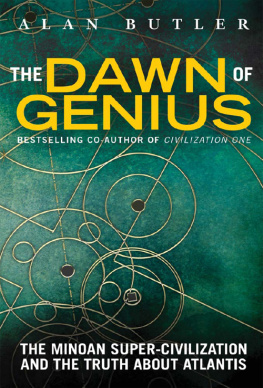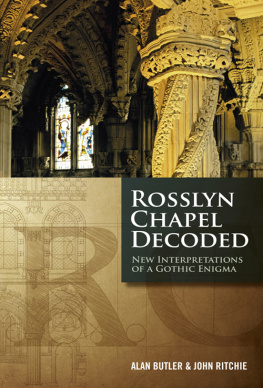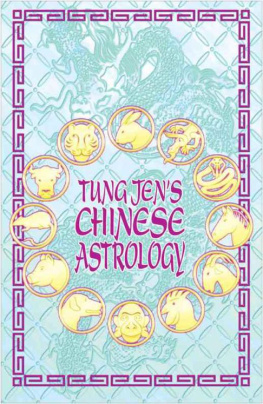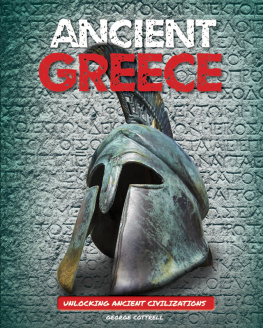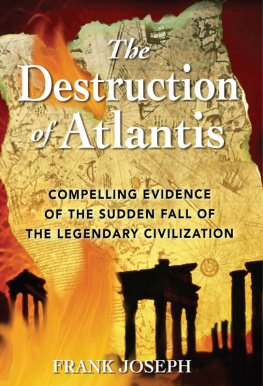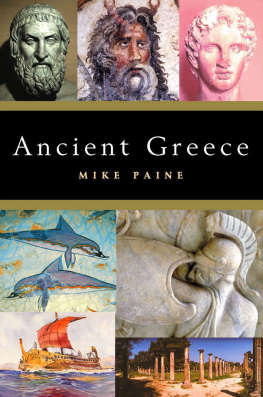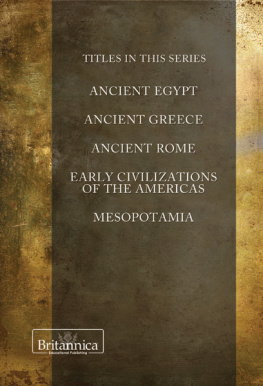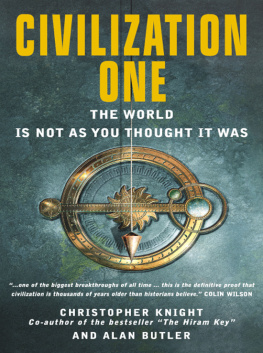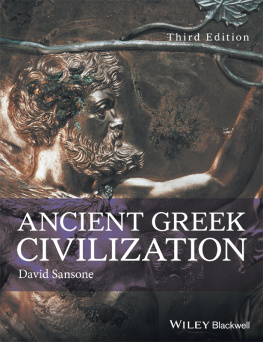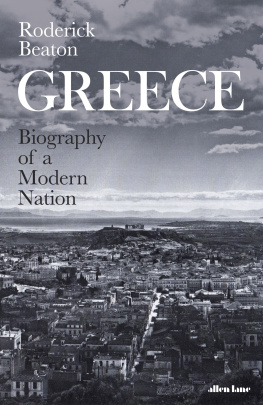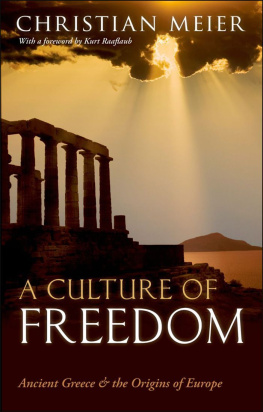Alan Butler has spent 30 years immersed in world history, writing books delving into neglected recesses of the past, including ancient cosmology. Three of his books written with co-author Christopher Knight have attained cult status: Civilization One (2004), Before the Pyramids (2009) and The Hiram Key Revisited (2010), all published by Watkins. His most recent title was Rosslyn Chapel Decoded (with John Ritchie; published by Watkins, 2013).
The Dawn of Genius
The Minoan Super-Civilization and the Truth About Atlantis
Alan Butler
Contents
Chapter 1
An Island in the Sun
At the time of writing this book it cannot be denied that the United States of America is the most powerful nation state in the world. The capital of the United States is Washington, DC, a city originally planned and commenced at the very end of the 18th century. Like any major city on the Earth, Washington, DC is something of an urban sprawl, but at its heart in its political and economic centre it is, without doubt, one of the most beautiful cities in the world. From the Lincoln Memorial in the west, right along the Mall to the Capitol, some of the most magnificent and even awe-inspiring architecture ever created by the hand of man is displayed for visitors and residents alike to see. All these buildings, such as the Capitol itself, the Jefferson Memorial, the White House and countless buildings given over to government, the United States economy and institutions of learning and science, have one thing in common they are built in a classical style.
In principle this says much about fashion at the time Washington, DC was conceived. The period during which a free United States became a reality was one in which intellectuals in Europe were looking back to the great civilizations of Greece and Rome. Whilst it is true that Western taste was captured by the grace and symmetry of Greek and Roman architecture, with its soaring pillars and grand porticos, it was far from being the case that those who turned to this style of architecture were catering only to a visual consideration. Rather they saw classical architecture as being representative of successful and powerful empires from the past. Even this notion was merely part of a departure in thinking that had followed the Renaissance.
The medieval period had been one of feudalism and repression. The reins of power had been held by Church and state combined. Anyone searching for truth, either spiritually or scientifically, had been liable to persecution, from repressive monarchies on the one hand and the cast-iron fist of the Roman Catholic Church on the other. With the religious Reformation that took hold from the 16th century onwards, large parts of Western Europe broke their ties with the Catholic Church. Even those areas that remained under its influence, for example Italy, became less restricted by its edicts and control. There is little doubt that many aspects of the Renaissance began specifically in the Italian city states, many of them right in the popes back yard. An increasingly corrupt and ethically bankrupt Church looked to retrieving its possessions throughout Western Europe, and at the same time failed to see what was happening on its own doorstep.
Once the genie of enlightenment was out of its bottle, nothing that either the Church or state might do could make it return. Lacking any confidence in the institutions of its own day, intellectual thought in Western Europe began to look back, to the apparent order and visual symmetry of the ancient world. Roman architecture had survived all across the vast sway of its empire but there was little original in Roman tastes. Practically everything the Romans created in terms of both civic and religious buildings owed their style to Ancient Greece.
At the same time something quite extraordinary began to take place. Long-lost writings by Ancient Greek thinkers and statesman began to find their way into Italy and subsequently across all of Western Europe. These had probably been present all along and many of them had been preserved by Arabic scholars, who were always much less fettered when it came to learning. These documents, from philosophers, politicians and mathematicians, reflected the very best of Ancient Greek thought. They spoke of personal aspiration, of a search for truth that was unrestricted by religious thought and of political institutions that were as far from those of the repressive Western European states as chalk is from cheese.
Greek art demonstrated a search for beauty for its own sake of the elevation of the very human form to a god-like status, whilst those of its buildings that survived showed an understanding of aesthetics allied to mathematics and geometry.
Probably most important of all, Renaissance thinking flirted with a concept practised in Ancient Greece but almost totally unknown in Europe throughout the medieval period democracy. The notion that ordinary people could take part in the order and running of the states in which they lived must have seemed at the same time outrageous and yet deeply compelling. However, democracy did make sense to people living in some of the city states of Italy at the time. Florence, for example, practised its own form of limited democracy. Its thinkers and even its leaders would have felt they had much in common with those who fitted the fluted pillars of the Parthenon together in ancient Athens.
The thinkers of the Renaissance and after could eventually enjoy the very best and most elevated thoughts of a long-dead culture, whilst at the same time knowing virtually nothing of its true history. Although Western Europe came to idolize Ancient Greece, with its democracy, its free-thinking philosophers and its schools of scientific learning, the truth of Ancient Greece, with its habitually warring states, its total reliance on a vast reservoir of slaves and its peculiar and often cruel traditions and laws remained unknown.
Ancient Greece as it was envisioned even by the 18th century, when Washington, DC was planned, was nothing short of a myth though like all myths it contained an element of truth. Its highest aspirations were idolized, whilst its many faults and failings were either not known or were deliberately ignored. The founding fathers of the United States, men such as George Washington and especially Thomas Jefferson, were intelligent men, committed absolutely to the enlightenment and to the very highest aspirations of Ancient Greece as they saw them. They deliberately copied elements of both Greek and Roman republicanism for their own free state once Britain had been beaten and the colonies could stand alone. As an example, the very structure where democracy operated and where the new states laws were laid down was called The Capitol, a reference to the Capitoline Hill in Rome, which was always seen as being the sacred and administrative heart of the Roman Empire. One of the legislative bodies of the United States republican democracy was and is named the Senate, another word derived directly from the Roman model of government, which itself owed much to Ancient Greece. In other words, the new United States republic based itself almost wholly and with pride on a quite seriously misunderstood version of an ancient world that was actually far from the paradise perceived.
Roman government, even during the republic, was despotic, cruel and on many occasions downright barbaric. Later, during the empire, Rome was ruled by a number of powerful factions and families, from which the emperors were drawn. With its reliance on slavery, its deplorable treatment of women, its flagrant disregard of the rights of its own people not to mention those of the regions it conquered Ancient Rome probably represents just about the worst role model for modern government imaginable. Ancient Greece, which consisted of hundreds of warring states, was hardly any better. In truth, both in the Greek city states and in Rome, only a tiny handful of citizens ever had any right to participate in government and the majority of individuals were studiously ignored and mistreated.
Next page
